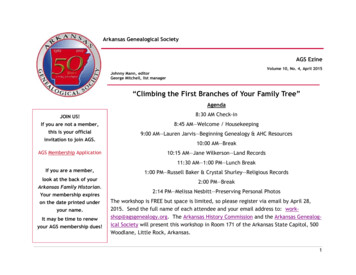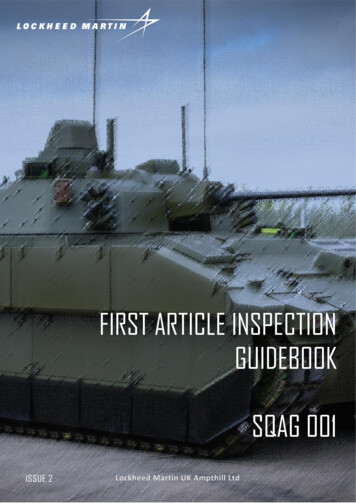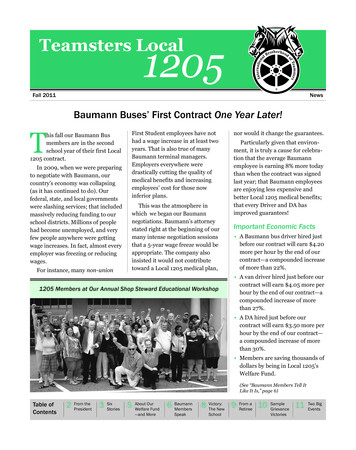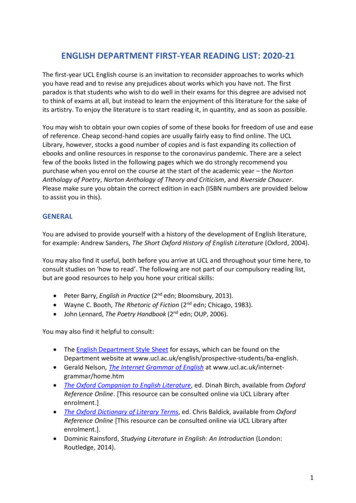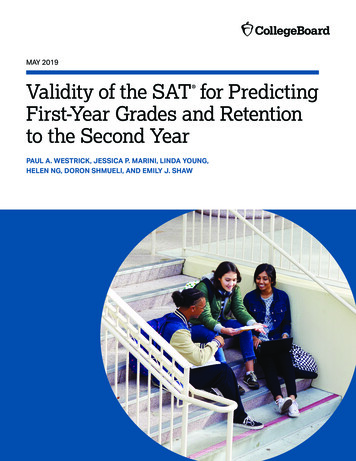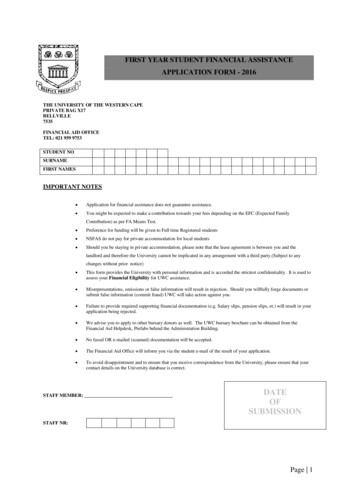
Transcription
dlia an New ZetraalusKumon–014d2anAFAMILY GUIDEBOOK:YOUR FIRST YEAR WITH KUMONStudentsrs– 3 0 Ye aofofPursuing th e P otential
Contents1. Introduction. p. 32. Set a ‘Kumon time’ each day. p. 33. Create a Kumon space. p. 44. Motivating and praising your children. p. 45. Marking your children’s work. p. 56. After Kumon study is done for the day. p. 57. Read with your children. p. 68. Supporting children when they do not want to complete their worksheets. p. 79. When absent from class. p. 710. Communication. p. 711. Frequently asked questions. p. 812. Further information. p. 112
1 IntroductionThis guidebook is designed for you to support your children’s home-study on their journeytowards advanced, independent learning.Even though your children attend the Centre twice a week, they will be learning at home forthe other five days of the week. Here is how to manage their home-study for the long-termwith easy-to-follow tips, as well as responses to frequently asked questions.2 Set a ‘Kumon time’ each dayThere are significant benefits in studyinga little each day; however, it can bechallenging to find time for Kumon studyevery day. In our experience, the bestway to establish and maintain a long-termstudy habit is to create a routine. Havinga routine helps to develop discipline andtime management skills, as well as settinga clear expectation of when Kumon is to bedone each day.To start a new routine, firstly look at your family’s weekly schedule, and then decide on when‘Kumon time’ will be. Try to make this time the same each day. If possible, schedule a timewhen you will be free to support your children’s learning, especially in the early stages of theirKumon study. Some days will be busier than others and unexpected events may arise, but tryto be consistent.Determine whether your children are better able to concentrate in the morning, afternoon orevening, particularly for children at school. For children not at school or when on holidays andweekends, schedule Kumon around an everyday activity like after breakfast or before dinner.Tips: Whether it be before or after school, have your children do their Kumon study priorto doing their school homework. This is so they are better able to concentrate and cancomplete the work as quickly and accurately as possible. Create a family timetable that is easy for all family members to see and know when‘Kumon time’ is. As children grow up, encourage them to make their own schedule that includes their dailyKumon study.3
3 Create a Kumon spaceThe place where your children study athome is important for the development ofconcentration and motivation. Choose anarea that will become their regular Kumonstudy space that is free from distractionssuch as the television, computers orexcessive noise. This could be at the kitchentable during a quiet time or in their room.The Kumon space should have pencils, asharpener, an eraser and a digital clock sochildren can time their work. For young children working on levels which require support(Pencil Skills Programme levels ZI and ZII, English levels 7A, 6A, 5A, 4A and 3A, and Mathslevels 6A, 5A and 4A), sit with them and follow the worksheet instructions carefully. Forchildren who prefer to work independently, still check on them regularly to ensure they arefollowing the instructions.Tips: Have your children sit in a chair that is low enough for their feet to touch the floor. Have the rest of the family also do a quiet activity to respect the concentration needed tostudy. At the completion of each day’s work, have your children set out the next day’s worksheetsin their Kumon space ready for the following day.4 Motivating and praising your childrenShowing enthusiasm and interest in your children’s daily study is an excellent form ofmotivation and support. By simply observing your children study or by checking in to see howthey are working, they will feel supported. If your schedule does not allow you to be with yourchildren while they study, check their workas soon as possible and give specific praisefor the effort that went into completing theirworksheets.Tips: Patience and persistence is vital to successin Kumon. By being patient with yourchildren’s progress and encouraging themto work through difficult problems, yourchildren will feel supported. Make sure your children understand theyare doing Kumon for their own benefit.4
Observe your children as they complete their worksheets so you know what to praisethem for, however do not interrupt their study.Give specific praise which focuses on your children’s effort and not only on theirachievements. E.g. “You learned to solve those fractions by yourself, great effort!” or “Youconcentrated very well today.”Remind them of how far they have come since starting Kumon. E.g. “You can read so manynew words compared to when you first started Kumon.” or “You have come so far sinceyou started with plus ones, now you are doing division!”5 Marking your children’s workMark your children’s worksheets as soon aspossible so that they can quickly correct andlearn from any errors. It also demonstratesyour interest and support. Answer booksand a marking guide are available from yourInstructor.Tips: It is normal for children to make errors. Donot criticise them for this, rather, follow the marking guide and mark it as an error, give theworksheets back to your children and encourage them to try again. Repeat this processuntil they have 100% of questions correct. This is an essential step in developing theirconfidence and independent learning skills. If your children are making a particularly large number of errors or are unable to correcttheir errors, notify your Instructor as soon as possible. Praise your children for how many questions they answered correctly or for how well theyread instead of highlighting their mistakes. You may like to draw a smiley face or write a comment on their work to show how proudyou are of their efforts. Ask your Instructor for advice to ensure consistency with theCentre’s marking method.6 After Kumon study is done for the dayAfter Kumon study is done for the day, make sure the completed and corrected worksheetsare placed neatly and in order in their Kumon student bag. This ensures the worksheets willbe handed to the Instructor at the next Centre day.Tips: Check your children’s Kumon student bag before they attend the Centre. It should contain:three sharpened pencils, an eraser and your children’s marked and completed worksheets5
as well as any uncompleted worksheets.This is so they can begin studying at theCentre without delay.Pleasereturnanyuncompletedworksheets to the Centre so theInstructor can update the study plan.For corrected and recorded worksheetswhich have come back from the Centre,consider using these to show yourchildren what they have achieved over aperiod of time or for your children to useas revision.7 Read with your childrenReading to your children or listening to yourchildren read will help them to develop ahabit and love of reading.Tips: Spend at least 5–10 minutes reading abook to your young children each day. Listen to your children read theirworksheets to you―especially thestory pages and praise them for theirefforts (Kumon English Programme). Access the Kumon Recommended Reading List and use this as a guide to select books tosuit the current reading level of your children. For pre-schoolers who find it difficult to sit still, try letting them draw or play quietly besideyou while you read or have them help you turn the pages. Read slowly with lots of expression. Put on different voices for book characters—the morefun you make it, the more they will develop a love of books and reading. If your children can read, take turns reading paragraphs or even whole pages. Help your children with words they are having trouble with. If English is not your first language, read books to them in your native language. (You canalso borrow English audio books from the local library). Become a member of your local library and visit with your family.6
8 Supporting children when they do not want to complete theirworksheetsIt is normal for children to lose motivation at times and not want to do their worksheets. Thiscan be for any number of reasons. When this occurs, check that all of the above guidelinesare in place. If they are still unmotivated, do not let it become an argument. Contact yourInstructor for advice if your children continue to not want to do their Kumon worksheets.Tips: Check that your children have a Kumon study time set aside each day. Check that your children have a Kumon space free from distractions. Remind your children of how Kumon has helped them.9 When absent from classThere will be times when your childrencannot attend the Centre. So that theirhome-study is not affected, please contactyour Instructor to make arrangements forthe collection of worksheets.Tips: Contact your Instructor as soon aspossible if you know your children willbe absent from their regular Centresession. E.g. if on holiday or unwell. Where possible, arrange to drop off completed worksheets and collect new worksheets sothat home study continues smoothly.10 CommunicationCommunicating with your Kumon Instructor is an important part of the Kumon Method.However, as Instructors give their full attention to the students during Centre operating times,we ask that you contact your Instructor outside of these times. So that your Instructor is ableto easily contact you, please let him/her know which times are most convenient for you andby what mode of communication you prefer to be contacted.Tips: Discuss with your Instructor, which modes of communication suits you best:– Telephone– Text message– Email– Face-to-face meeting– Monthly Newsletter7
You may also choose to leave a message at the Centre for your Instructor to follow up onafter class.If you have any observations, questions or concerns about your children’s home study orongoing progress in Kumon, please contact your Instructor.11 Frequently asked questionsQ: How are these worksheets helping my children when they do not match what my child islearning at school?A: Most students start their Kumon study at a level below what they are studying at school.This helps them to develop a strong foundation and address any gaps they may have had intheir learning prior to starting Kumon. For example, if a child is struggling with fractions atschool, he/she would not begin their Kumon study with fractions. Rather, he/she would needto review multiplication and division, which are essential for understanding fractions. In time,school work becomes revision and topics like fractions can be tackled with confidence.Many topics covered in the broad school curriculum are not included in the Kumon worksheetsso children can develop the core calculation and reading comprehension skills as quicklyas possible. The Kumon English worksheets focus on topics intended to develop children’sreading comprehension. The Kumon Maths worksheets focus on the topics necessary forthe study of senior high school mathematics. Strong reading comprehension and calculationability form the foundation for success in all subjects at school.Q: What if Kumon homework becomes too much for my children who already have a rangeof other commitments?A: Kumon requires daily study to be most effective. When planning your children’s activityschedule, particularly in their first year at Kumon, please take the level of commitment requiredfor Kumon into consideration so they do not become overburdened. As they continue to learnwith Kumon, many students become better at managing their time and can undertake a rangeof other commitments. They are also able to complete their school homework more quicklyand efficiently. However, as children progress, the difficulty and time required to complete theworksheets may increase. Please contact your Kumon Instructor if your children are unable tocope with the workload.Q: What if my children have not done their assigned Kumon worksheets?A: Unexpected events may arise which will prevent your children from completing a dayof Kumon study. If your children are motivated to complete two days of Kumon work thenext day, encourage them to do so. If not, have them continue from where they left off thefollowing day. It is important to return both the completed and uncompleted worksheets tothe Centre on the next Centre day. This is so the Instructor can see what your children haveand have not completed and adjust their study plan accordingly. Do not keep uncompletedworksheets at home.8
Q: Why are my children repeating the same sets of worksheets?A: Providing children with the chance to practice is a key aspect of the Kumon Programme.Through practice, students become faster and more accurate―two key measures ofcompetency in mental calculation and reading compre
Reading to your children or listening to your children read will help them to develop a habit and love of reading. Tips: Spend at least 5–10 minutes reading a book to your young children each day. Listen to your children read their worksheets to you―especially the story pages and praise them for their efforts (Kumon English Programme).
